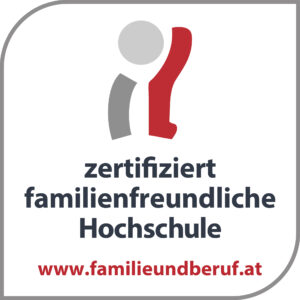Family and Diversity Audit
The University of Salzburg sees itself as an open, discrimination-critical, and forward-thinking institution. The PLUS conducted two audits in 2022 to enhance the visibility and sustainability of inclusion, diversity, gender, as well as the compatibility of family and career or studies for all university members: the “Diversity and Gender Equality Audit” and the “Family Audit”. On 1 February 2023, both audits were evaluated and certified by TÜV Austria.

Diversity and Gender Equality Audit (Initial Accreditation)
In five intensive workshops, some lasting a whole day, a group made up of academic and administrative staff as well as students explored various aspects of diversity and gender equality and were able to outline several possible measures – a process guided by “ Zukunft Vielfalt” (Future Diversity). After reviewing, discussing and setting priorities, these measures were incorporated into a target agreement, which includes the following aspects, among other things:
- Publicise contact persons in the university administration for diversity issues;
- Develop a code of conduct for a discrimination-free and diverse university;
- Create a guideline for gender-inclusive language (“PLUS Sprachbox”);
- Establish additional anti-discrimination measures;
- Establish a process for dealing with incidents or allegations of bullying/discrimination;
- Offer regular training opportunities on diversity and gender equality for all staff members;
- Improve gender representation in various areas and committees;
- Enhance/create learning spaces for students.
You can find the report from Zukunft Vielfalt at the following LINK.

University and Family Audit (Re-Accreditation)
The University of Salzburg were awarded the “ Familienfreundliche Hochschule” certificate for the years 2019 to 2021. During the re-audit process, as supervised by the agency Kibis, the current status quo and potential future measures were discussed and prioritised in two workshops. These measures were also included in a target agreement. Over the next three years, the following actions, to name a few, are planned:
- Develop flexible teaching and exam organisation;
- Consider a balanced distribution of parallel group classes across several days and times;
- Develop of a guide for lecturers on handling student absences;
- Conduct surveys on the work-life balance of students and lecturers;
- Continue integrating family-friendly practices into leadership tools.





